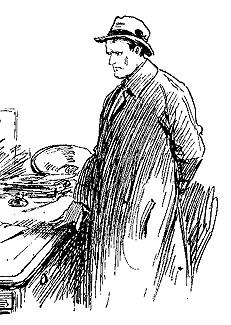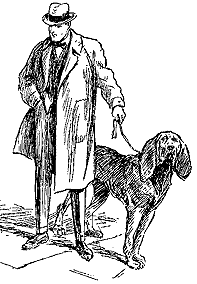I MEET MRS. TEED
by W. O. G. Lofts
 It is still remarkable when I think of it. After searching Wales for the widow of Mr. Gwyn Evans, and eventually finding her actually living a short distance away from me in London in the NW1 district, I then find the widow of Mr. G. H. Teed, after searching London, living down in South Wales. Such is the experiences of a researcher.
It is still remarkable when I think of it. After searching Wales for the widow of Mr. Gwyn Evans, and eventually finding her actually living a short distance away from me in London in the NW1 district, I then find the widow of Mr. G. H. Teed, after searching London, living down in South Wales. Such is the experiences of a researcher.
Now living at Penarth, a suburb of Cardiff, is an elderly lady who has very nostalgic memories about the greatest of all pre-war Sexton Blake authors. Her name of course is Mrs. Ivy Teed. Now aged 78, I have found her an extremely interesting correspondent, and with the mental abilities of one many years younger. Especially so where data is concerned about such a great author. Such was my interest in the letters that Mrs. Teed wrote me, that I thought it worth while a visit to see her. In conversation, one can get through far more things than lengthy correspondence. Accepting Mrs. Teed's kind invitation to lunch, I caught the now fast Pullman train from Paddington, and within three hours was meeting Mrs. Teed at her home, where she now lives with her sister.
Looking younger than her years; Mrs. Teed bears some resemblance to Barbara Mullen of 'Dr. Finlay's Casebook', and I soon found that she was an extremely well educated and cultured person. During our talks, I was able to gather quite a large number of new facts about George Hamilton Teed. Mrs. Teed always used to call him 'Hamilton' and so for the sake of brevity I will likewise call him that in this article.
George Heber Hamilton Teed, to give him his full correct name, was born at a small place near St. John's, New Brunswick, Canada. His father was Almon Isiah Teed, a very prosperous merchant, who owned saw-mills, a fleet of boats, a coffee plantation in South America, and also used to ferry goods right out to the West-Indies. At an early age Hamilton's father died, and his mother married again, but his father's business was shared out between him and his two sisters. Educated at Canada's most exclusive school, McGill's University, Hamilton, it could be said, had as good an education as anyone in this world. Whilst in his teens, Hamilton, who by this time had had a step-brother who he simply did not get on with at all, decided to see the world: "I wanted to see the palm trees" was his explanation many years later to Mr. H. W. Twyman, editor of the UNION JACK. Hamilton certainly saw far more than this; as he travelled round the world twice before eventually finishing up as a sheep-farmer in Australia.
Unfortunately, the drought one year beat our author, and early 1912 saw him on the boat to England almost broke, and with no prospects of a job in the home country. During the long voyage 'home' as it were, Hamilton made the acquaintance of a lady name Mrs. Storm. One only has to experience the long journey on a passenger liner to appreciate the fact that within a short time Hamilton became great friends with her. Listening sympathetically to his troubles and hard luck down-under, Mrs. Storm, who by her account had recently lost her husband and was a widow, was on the way back to England to inform his publishers of his death, and to get them to publish some of his work, which she had found amongst his (Michael Storm's) effects.
 Becoming greatly interested in the scripts that Mrs. Storm showed him, eventually it was decided that Hamilton would write some stories and Mrs. Storm would take them up to Fleetway House and get them published as being by the hand of the late Michael Storm. It should be added that Michael was regarded as a brilliant author and anything from his pen was usually accepted without question. As it is well known now, this materialised, and eventually Hamilton appeared himself to the astonishment of Willie Back (the then editor of UNION JACK), who thought that the 'ghost' of Michael Storm must really have arrived, as their styles were so similar.
Becoming greatly interested in the scripts that Mrs. Storm showed him, eventually it was decided that Hamilton would write some stories and Mrs. Storm would take them up to Fleetway House and get them published as being by the hand of the late Michael Storm. It should be added that Michael was regarded as a brilliant author and anything from his pen was usually accepted without question. As it is well known now, this materialised, and eventually Hamilton appeared himself to the astonishment of Willie Back (the then editor of UNION JACK), who thought that the 'ghost' of Michael Storm must really have arrived, as their styles were so similar.
So much has been written in the past and recently on Mrs. Storm, that I will simply close my remarks about her by saying that she was a very strong willed woman and eventually she and Hamilton had a dispute and they parted company.
Now an established Sexton Blake writer, the war in 1914 saw him in Paris. Returning to London, he joined the King Edward's Horse, a Canadian troop, and served in France. Later he was stationed in Dublin, where he became very ill with pneumonia. Invalided out of the services, he was offered a post in French Cochin which he accepted and so did not resume his writing career. Possibly he thought that the hot climate on the west coast of Southern India would be far more beneficial to his health than the damp in England. It was here, as branch manager of an export firm, that he first met Mrs. Ivy Teed at a fancy dress ball, who incidentally was the daughter of a government official. They were married in 1920, and with the closing down of the export branches, Hamilton decided to resume his career in London writing Sexton Blake yarns, and so they arrived back in England in 1921.
After a short while, they moved over to France, where they lived in the Latin quarter in Paris. Mrs. Teed took a deep interest in her husband's writings and they often used to discuss plots. Hamilton’s favourite character was that arch criminal Huxton Rymer, whilst he based Yvonne on his favourite actress star Yvonne Arnaud. He used to type his stories straight out with no pages ever wasted and no subbing afterwards. But above all he really enjoyed writing his Blake yarns, which is certainly different from some authors I have met who considered writing a grind, and more like an imposition. If any author ever influenced him it was obviously Michael Storm, and he used to enjoy talking about him and his writings. Not of course knowing that such interest would be shown about Michael Storm some 50 years later, Mrs. Teed unfortunately did not remember as much as she wished she had done at the time about this author — except to say that most certainly her husband had never met him, as he had died long before Hamilton ever contemplated writing Blakes.
Mrs. Teed can well remember Mr. H. W. Twyman coming to Paris to discuss a plot with Hamilton for a story. They went to a cathedral and became so engrossed in a theme for a plot that Hamilton picked up a jewelled scarab and put it in his pocket. It took a lot of explaining to the guide before things were back to normal!
 Hamilton could speak French fluently, as he had learned it in his boyhood in Canada, where French is the second language. Surprisingly, he very rarely talked about his old home life and he eventually sold his shares in his father's business, after a sister had visited him in London. Hamilton, however, often brought his own real life adventures into his stories, and what man better than he with his vast experience in world travels, and with his various localities so authentic in colour.
Hamilton could speak French fluently, as he had learned it in his boyhood in Canada, where French is the second language. Surprisingly, he very rarely talked about his old home life and he eventually sold his shares in his father's business, after a sister had visited him in London. Hamilton, however, often brought his own real life adventures into his stories, and what man better than he with his vast experience in world travels, and with his various localities so authentic in colour.
Towards the end of the 1930s, however, Hamilton became very ill, and eventually died in London at Whitechapel, just before the war. Mrs. Teed has an old, now very tattered copy of the UNION JACK which her husband wrote, which has been read over and over again; and two bound books "Volcano Island" and "The Voodoo Queen", one of which is autographed and has a photograph of Hamilton in his prime inside the cover.
Memories not only of a husband but of probably the greatest Sexton Blake writer of them all.
© W. O. G. Lofts
